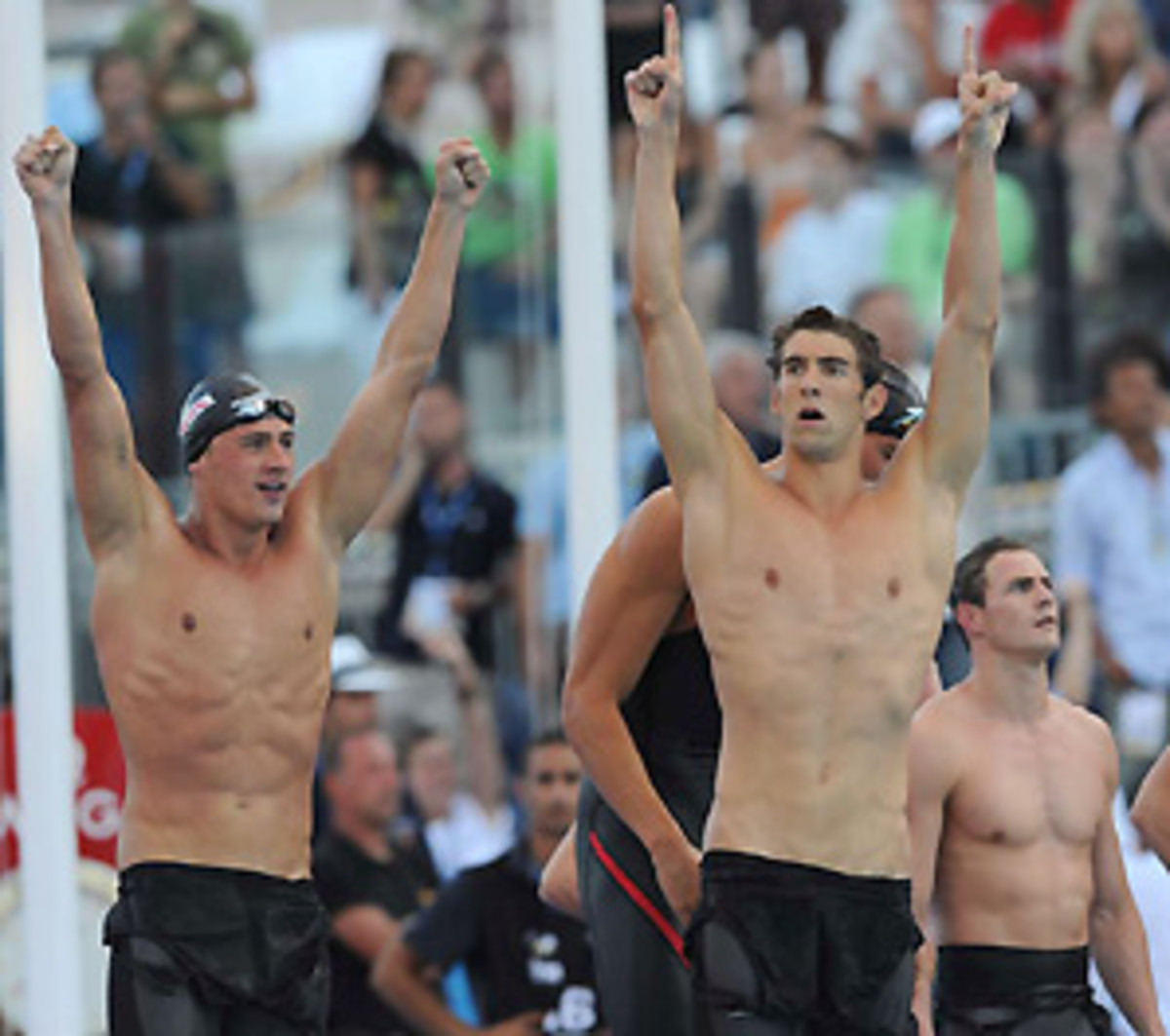Phelps, U.S. relay team steal spotlight at record-setting worlds
Instead, a completely revamped U.S. quartet of Phelps, Ryan Lochte, Matt Grevers and newcomer Nathan Adrian held off the field to bring home another relay gold. The heavily favored French struggled to third behind the surprise silver medalists from Russia. Yes, put the Euros on the line and the French wade the waters like escargot. "Tonight, the Americans were better than us," said relay member Fred Bousquet. "Some days you have it; some days you don't."
Phelps led off for the U.S. team and didn't swim his best leg, pulling into third in 47.78 seconds. "The best thing about tonight's race," said U.S. head coach Bob Bowman, "is that the other guys carried Michael. We needed the others to step up."
That included Lochte, who often follows Phelps in 200-meter legs of the 800-meter relay, a distance that better suits him. Lochte went head-to-head against Bernard, a surprising choice to swim the second leg. "I looked to my left and saw Bernard and he's like seven feet tall," Lochte said in exaggeration. "I was like, how am I going to swim against this guy?" Instead, Lochte aced the challenge, speeding by in 47.03 seconds and keeping the U.S. team in the hunt, half a stroke behind the French. After Grevers put together a 47.61, it left Adrian, the new kid on the swim blocks to get off them quickly. "I felt like a child among men," Adrian said afterwards. "They threw me on the last leg and I had a lot of pressure on me."
Bowman made the call on that, sensing that Adrian, 20, is the team's future, especially with Lezak, 33, in Israel honoring his Jewish heritage at the Maccabiah Games. "He has to get used to it some point," Bowman said of the anchor assignment. "He's very tough and strong under pressure. He keeps his wits about him. If he's going to be in that position, this is a good place for him to start."
Adrian swam a 46.79 anchor, a full .63 seconds faster than Bousquet over the last 100 meters. He punched the water in his excitement, spraying the Frenchman, who may not have noticed. Earlier in the month, Bousquet and Bernard criticized Phelps for not swimming the open 100 meters in Rome, because, they suggested, he might have been afraid to face them. It was the same sort of talk we heard from the French before their ill-fated relay effort in Beijing, and talk has a way of biting them on the derriere.
The night of records was a stunner. It was as though the man who measured the fences at the new Yankee Stadium took out his poorly calibrated ruler for the lanes at Foro Italico. In fact, much had to do with the fast suits that are soon to be outlawed for good. They are on their last legs here in Rome. In all, one relay record fell to the Dutch women in the 4x100-meter relay (3:31.72). In that race, the leadoff swimmer on the German relay, Britta Steffen, established an individual world mark of 52.22.
How fast are the times likely to be the rest of the week here in Rome? Consider that in Sunday's evening session, swimmers set four world records in the first four events . . . and three of those events were only semifinals. First Sweden's Sarah Sjostrom snapped the mark 100-meter butterfly set by Dutchwoman Inge de Bruijn at the 2000 Sydney Olympics, touching the wall in 56.44 seconds to win her semifinal heat. Inge deBruijn's mark for years struggled to pass the doping smell test in the way BarryBonds' home run marks did. Now the oldest women's individual mark is off the books.
Then just 15 minutes later, Germany's Paul Biedermann won the gold medal in the 400-meter freestyle, finishing in 3:40.07 to break the daunting world record set by Australian great Ian Thorpe at the 2002 Commonwealth Games in Manchester by a scant hundredth of a second. Before tonight, Thorpe had recorded the eight fastest times in history. "I saved some power for the last 50 meters," Biedermann said, "but I didn't not expect to be near a record. I am sort of shocked."
Korea's Park Tae-hwan was the first notable casualty of the swim events at the world championships. The Olympic champion in the 400 free, failed to advance out of the morning preliminaries, drifting into 12th place. Afterwards, Park said only that he had been unable to train properly and had been feeling the pressure from his post-Olympic hype. A Korean reporter said here that the word is that Park has had several conflicts between family plans and sponsor obligations that have caused rifts in both directions.
Seattle's Ariana Kukors was a late addition to the field in the 200-meter individual medley, after finishing third in the race at nationals earlier in the month. When coaches decided Elizabeth Pelton had too many races on her plate, Kukors became the pinch hitter and then hit a stunning home run. Kukors swam a miraculous 2:07.03 in the semis, breaking the previous world record of 2:08.45 set by Australia's Stephanie Rice at the Beijing Olympics. "Nobody expected anything from me in this event," Kukors said. "The world record is a big surprise to me."
Italian Federica Pellegrini smashed the four-minute barrier in the 400 free, delighting the home crowd, when she hit the wall in 3:59.15, 1.45 seconds ahead of Britain's Joanne Jackson in second place. Pellegrini's medal color was never in doubt, and she was already the world-record holder, after swimming 4:00.41 earlier this year, but she had been chasing a Roger Bannister moment for a while. "I knew I wanted to go under four minutes with everyone cheering for me," she said. "It will always be the most special moment of my career."
Expect many more of those moments before the week is done.





